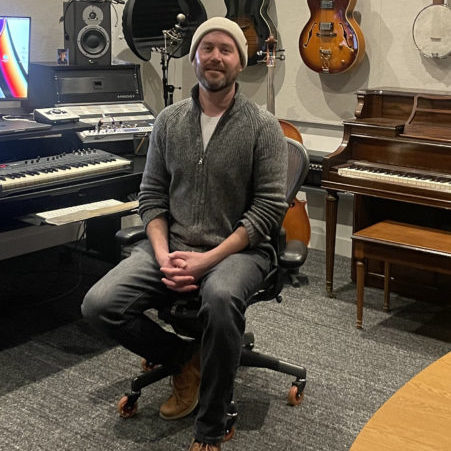Brendan Quinn
Creative Director
Bachelor of Arts (Hons), 2003
I learned so much from the tutors and professors at King’s... I do think that the foundation was laid in terms of being able create something.
Brendan Quinn, BA(Hons)’03, can’t wait until his new recording studio is ready so he can have his picture taken at the console. A creative director at Vapor Music, one of Toronto’s largest post-production audio facilities, he says the new office and recording studio is not only state of the art, he’s going to have instruments at hand, including his grandfather’s banjo.
As one of the key players on the team that works on animated children’s series, the hours are long and the timelines tight. He says the pandemic didn’t help, adding, “I’ve never experienced that level of intensity.”
What he loves about long-form composition for animation, as compared to composing music for commercials, is that the dialogue and the soundtrack come first. He says they usually drive the visuals. He likes this new configuration of being involved in the earlier stages of a project.
Responsible for entire shows, like the award-winning Netflix kids’ series, Hilda, Brendan isn’t always composing, but he’s still very much a part of the creative process.
Brendan says that music is part of his genetic structure. By way of explanation, he shares the story of how his grandparents met in England, during the Second World War. His grandmother was a nurse and nurses weren’t allowed to socialize with doctors, but she would go to the piano in the hospital and play Für Elise for everyone to hear. Beethoven’s famous piece was the cue for a doctor, the man who became Brendan’s grandfather, to meet her in secret.
Brendan’s musical interests started early. In grade 4, he wasn’t putting much effort into his piano lessons and his mother and piano teacher threatened to call it quits. He says they conspired, knowing how he’d react. “I just had this moment where I realized music was obviously very important to me.” From then on, he became much more respectful of his teacher’s time and effort.
After years of Royal Conservatory piano, Brendan started a band in high school with his best friend Jon Ophek, BA(Hons)’03. Several years later, Jon joined Brendan at King’s and along with Guy Godfree and Dom Hanlon,’03 they became a band called PDQ.
The band takes its name from his father’s initials, which became the friends’ vernacular for someone who was getting too intense. There’s no malice intended; Brendan says—this is an endearing quality of his father’s.
“The first gig we got was to play the Wardroom and it was, basically, ‘just make your friends come out and drink beer and suffer,’” Brendan says with a self-effacing grin. Looking back, he says the Wardroom was ‘magical’. “It’s where they learned to set up equipment, get over stage fright and where they started to perform their own music. It’s also where Brendan held the prized position of happy hour bartender.
Wardroom gigs became more frequent, thanks in part to Daniel Shearer, BA’03, who took on the role of unofficial promoter—and PDQ built a following. Eventually, their feel-good, soft rock sound was being sought out by other venues in Halifax, like the Marquee.
When graduation came, PDQ decided to go on the road for a year. “That was an amazing trip,” Brendan says, but adds, “It was just very exhausting. By the end of all of it, we were kind of ragged—not making enough money.” Their last gig was in a tree planting camp in Northern Ontario. The beds, along with 21 hours of driving to reach the camp, he chuckles, broke their lead singer and guitarist.
After the friendly break-up, Brendan spent a year and a half in Australia taking an audio engineering course. Citizenship complications brought him back to Canada where he launched his career in the post-production sound world. He spent time working for companies like Pirate (now a competitor) and briefly ran his own business.
Brendan’s been with Vapor through almost a decade of big changes, including the acquisition of another company. Even though his current position as creative director means less time composing and more time on business and managing projects, he still loves to problem solve in the studio. Problems like the one he encountered in ‘Donutty Day,’ an episode in a series called Mighty Express. Another Netflix kids’ show, it was constructed with pictures before sound. Because Brendan couldn’t match what he saw—he’d have needed the real sound of construction pipes falling down a mountain—he used tubular bells and the episode became a musical. In the end, he says, the story was more dramatic.
Another bonus of working in the long-form composition world is that his kids are in the same age range as the target audience The day he heard his kids singing something he’d been working on, word for word, it all made sense. Reflecting on the path that brought him here, Brendan says he’s grateful for the opportunities that led him to this profession.
